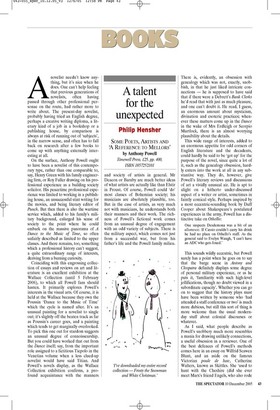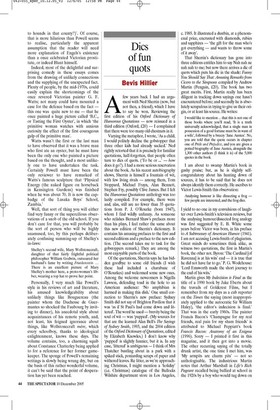A talent for the unexpected
Philip Hensher
SOME POETS, ARTISTS AND ‘A REFERENCE TO MELLORS’ by Anthony Powell Timewell Press, £25, pp. 400, ISBN 1857252101 Anovelist needn’t know anything, but it’s nice when he does. One can’t help feeling that previous generations of novelists, often having passed through other professional personae on the route, had rather more to write about. The present-day novelist, probably having tried an English degree, perhaps a creative writing diploma, a literary kind of a job in a bookshop or a publishing house, by comparison is always at risk of running out of ‘subjects’, in the narrow sense, and often has to fall back on research after a few books to come up with anything externally interesting at all.
On the surface, Anthony Powell ought to have been a novelist of this contemporary type, rather than one comparable to, say, Henry Green with his family engineering firm, or Roy Fuller drawing on his professional experience as a building society solicitor. His peacetime professional experience was limited to working in a publishing house, an unsuccessful stint writing for the movies, and being literary editor of Punch. But then there is also the wartime service which, added to his family’s military background, enlarged his sense of society to the point where he could embark on the massive panorama of A Dance to the Music of Time, so often unfairly described as limited to the upper classes. And there remains, too, something which a professional history can’t suggest, a quite extraordinary range of interests, deriving from a burning curiosity.
Coinciding with this engrossing collection of essays and reviews on art and literature is an excellent exhibition at the Wallace Collection (until 5 February 2006), to which all Powell fans should hasten. It primarily explores Powell’s interests in the visual arts. Of course, it is held at the Wallace because they own the Poussin ‘Dance to the Music of Time’ which the cycle is named after. It’s an unusual painting for a novelist to single out; it’s slightly off the beaten track as far as Poussin’s career goes, and a painting which tends to get marginally overlooked. To pick this one out for stardom suggests an unusual degree of connoisseurship. But you could have worked that out from the Dance itself; say, from the important role assigned to a fictitious Tiepolo in the Venetian volume when a less clued-up novelist would have said Titian. And Powell’s novels display, as the Wallace Collection exhibition confirms, a profound acquaintance with the manners and society of artists in general. Mr Deacon or Barnby are much better ideas of what artists are actually like than Elstir in Proust. Of course, Powell could ‘do’ most classes of Bohemian society; his musicians are absolutely plausible, too. But in the case of artists, as very much not with musicians, he understands both their manners and their work. The richness of Powell’s fictional work comes from an unusual degree of engagement with an odd variety of subjects. There is the military aspect, which comes not just from a successful war, but from his father’s life and the Powell family milieu. There is, evidently, an obsession with genealogy which was not, exactly, snobbish, in that he just liked intricate connections — he is supposed to have said that if there were a Debrett’s Bank Clerks he’d read that with just as much pleasure, and one can’t doubt it. He read, I guess, an enormous amount about mysticism, divination and esoteric practices; whenever these matters come up in the Dance in the wake of Mrs Erdleigh or Scorpio Murtlock, there is an almost worrying plausibility about the details.
This wide range of interests, added to an enormous appetite for odd corners of English literature and the decadents, could hardly be said to be ‘got up’ for the purpose of the novel, since quite a lot of it, such as the genealogy obsession, hardly enters into the work at all in any substantive way. They do, however, give Powell’s literary reviews and discussions of art a vividly unusual air. He is apt to alight on a hitherto under-discussed aspect of a writer or artist, sometimes in faintly comical style. Perhaps inspired by a most eccentric-sounding book by Duff Cooper about Shakespeare’s postulated experiences in the army, Powell has a distinctive take on Othello: One suspects Desdemona was a bit of an allumeuse. If Cassio couldn’t carry his drink he had no place on Othello’s staff. As the general said to Evelyn Waugh, ‘I can’t have an ADC who gets foxed.’ This sounds wildly eccentric, but Powell surely has a point when he goes on to say that the barge scene in Antony and Cleopatra definitely displays some degree of personal military experience, or as he puts it, ‘familiarity with such high-level jollifications, though no doubt viewed in a subordinate capacity’. Whether you can go on to suggest that the history plays must have been written by someone who ‘had attended a staff conference or two’ is much more dubious, but still this sort of thing is more welcome than the usual modernday stuff about colonial discourses or whatever.
As I said, what people describe as Powell’s snobbery much more resembles a mania for drawing unlikely connections, a useful obsession in a reviewer. One of the best defences of Powell’s methods comes here in an essay on Wilfrid Scawen Blunt, and an aside on the famous Victorian poule de luxe, Catherine Walters, known as Skittles. She ‘used to hunt with the Cheshire (did she ever meet Marx’s friend Engels, who also rode to hounds in that county?)’. Of course, that is more hilarious than Powell seems to realise, particularly the apparent assumption that the reader will need more explanation of Engels’s existence than a once celebrated Victorian prostitute, or indeed Blunt himself.
Indeed, most of the delightful and surprising comedy in these essays comes from the drawing of unlikely connections and the supplying of the unexpected fact. Plenty of people, by the mid-1970s, could easily explain the shortcomings of the once revered Victorian painter G. F. Watts; not many could have mounted a case for the defence based on the fact this one was quite new to me — that he once painted a huge picture called ‘B.C., or Tasting the First Oyster’, in which ‘the primitive woman watches with anxious curiosity the effect of the first courageous gulp of the primitive man’.
Watts wasn’t the first or the last man to have observed that it was a brave man who first ate an oyster, but he must have been the only one who painted a picture based on the thought, and a most unlikely one to have undertaken the task. Certainly Powell must have been the only reviewer to have remarked of Watts’s famous sculpture that ‘Physical Energy (the naked figure on horseback in Kensington Gardens) was finished when he was about 70. It is now the capbadge of the Lusaka Boys’ School, Zambia.’ Well, that sort of thing you will either find very funny or the supercilious observations of a snob of the old school. If you don’t care for that, you will probably be the sort of person who will be highly unamused, too, by this perhaps deliberately confusing summing-up of Shelley’s in-laws:
Shelley’s second wife, Mary Wollstonecraft, daughter of that fairly frightful political philosopher William Godwin, outsoared her husband’s fame by writing Frankenstein ... There is an excellent picture of Mary Shelley’s mother here, a proto-woman’s libber, wearing a top hat to prove her point.
Personally, I very much like Powell’s style in his reviews of art and literature, his amused knowledgeability about unlikely things like Bouguereau (the painter whom the Duchesse de Guermantes so shocked the Faubourg by inviting to dinner), his anecdotal style about acquaintances of his remote youth, and, not least, his feigned ignorance about things, like Wollstonecraft mère, which every schoolboy, thanks to ideological enlightenment, knows these days. The volume contains, too, a charming squib about Constance Chatterley being applied to for a reference for her former gamekeeper. The sponge of Powell’s remaining writings is slowly being wrung dry, but on the basis of this rather wonderful volume, it can’t be said that the point of desperation has yet been reached.


























































 Previous page
Previous page